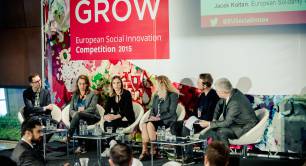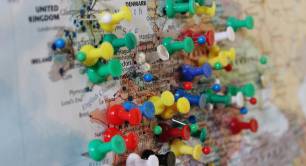EU gathers social innovators to brainstorm new inclusive future
Foward-looking Berlin seems an ideal setting to encourage the development of social innovation. Invited to report on the 2016 European Social Innovation Competition, Pioneers Post was taken to a succession of buildings that had formerly been a factory, a residential home for the elderly and a railway depot. They are now events spaces and home to both art collectives and migrants (or ‘newcomers’, the term one of the residents preferred).
The annual European Social Innovation Competition seeks to identify (and put some money behind) projects that will make a positive difference to society. The theme of this year’s competition, which closed in April, is ‘Integrated Futures’ which required entrants to offer responses to the challenge of the increasing numbers of refugees and migrants arriving in Europe.
More than 1,000 entrants were narrowed down to 30 semi-finalists who were invited to attend an Academy in Berlin from 4 to 6 July to help them fine-tune their proposals. They will then submit a more detailed plan to the judges. Finally, ten will go to Brussels in October, where three will be announced as the winners and given €50,000 to help fund their social venture.
So why is there a need for social innovation? If there were any doubts, the challenges were set out by Nora van der Linden (above) from Dutch think tank Kennisland in the opening address to the Academy at the Kalkscheune in Berlin.
In front of a projection of David Cameron and Boris Johnson, van der Linden highlighted a few of the more recognised social challenges, including an increasing lack of faith in government, looking after an ageing population, changing energy supplies due to environmental pressures, concerns over the pros and cons of technological innovation (will robots help us or increase unemployment?), and the reason why all these people were gathered in a room – the challenges caused by migration.
Van der Linden claimed the rise of social innovation as 'the new paradigm'. She was critical of the old paradigm, which was this: "Figuring out solutions would lead to research and development. Patents would follow, economic growth coming next, with jobs and stability being the end result. If you invest money in the right things, it will trickle down into society and social issues will be solved."
We're in the middle of that transition that taps into the power of civil society
Social innovation should replace this paradigm: "We're in the middle of that transition that taps into the power of civil society and where alternative innovative solutions are developed from the bottom up by grassroots initiatives," she said.
Van der Linden followed this up by encouraging the social entrepreneurs present to identify their guiding principles by considering the following questions:
- What are your underlying values?
- What is your theory of change?
- What is the problem behind the problem?
- Where do you start – in the system or outside?
- How does this all correspond to your existing activities?
- Who might be excluded by your activities?
She was followed onto the stage by Ian McCafferty, a social media strategist at the EU, who offered a timely reminder of how quickly the refugee crisis has grown. It was only five years ago, in May 2011, that peaceful protests in Syria took place. The civil war that followed meant citizens fled to Jordan; the Zaatari refugee camp there was taking in 10,000 refugees every month by July 2012.
The point at which Europe was forced to take notice was probably the Lampedusa disaster in 2013, when more than 360 migrants from Somalia, Eritrea and Ghana drowned trying to reach the small Italian island after their boat capsized.
McCafferty ran through some of the media coverage that followed and the many different ways of viewing a situation. He spoke of UK Prime Minister David Cameron’s choice of the word ‘swarm’ to describe migrants coming through Calais, UK Independence Party leader Nigel Farage’s posters of queues of people waiting to enter the UK (actually Croatia), and the stark image of Aylan Kurdi, the three-year-old Syrian boy who washed up dead on a Turkish beach after the boat he was travelling on capsized.
Ideas for projects amongst the semi-finalists promote understanding and inclusion between the residents of European countries and the newcomers. McCafferty’s presentation was a sobering reminder of how quickly a situation can escalate and how vital social innovation is.



